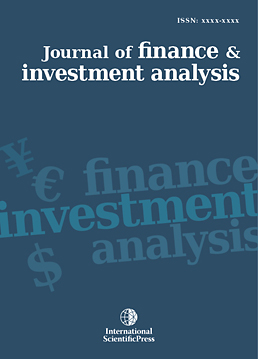Journal of Finance and Investment Analysis
Effect of foreign equity flows on stock market volatility in Kenya Empirical evidence at Nairobi securities exchange
-
 [ Download ]
[ Download ]
- Times downloaded: 15499
Abstract
The study examined the effect of foreign equity flows on stock market volatility in Kenya. The effect of foreign equity purchases and sales turn-over and foreign equity purchases and sales volume on stock market volatility in Kenya were established. The moderating effect of foreign exchange rate on the effect of foreign equity flows on stock market volatility was also analysed in the study. The study was undertaken at the Nairobi Securities Exchange for a period of eight years from 2008 to 2015. Causal research design was used. The target population of the study were the monthly foreign equity flows, monthly NSE-20 share indices, monthly USD Bid-Ask FOREX. Time series secondary data was used in the study. The data was subjected to diagnostic tests such as linearity, multi-collinearity, normality, homoscedasticity tests and test for auto-correlation with E-views being the main statistical tool of analysis. The main model used in the study was the vector error correction model subsequent to undertaking stationarity, lag selection and cointegration tests. The study revealed that foreign equity flows does not statistically affect the current stock market volatility at the NSE prior to and after introduction of the moderating variable, USD FOREX mean and that the current stock market volatility at the bourse were caused by lagged values of the stock market volatility during the study period, further buttressing granger causality test results. Further results from Impulse Response Function indicate that it takes a shorter period of time for the effect of foreign equity flows shocks to dissipate in the stock market and that the proportion of shocks in the stock market volatility were attributed to the market volatility itself with a recommendation for formulation and implementation of efficacious policies that would spur market integration thereby increasing foreign investor activities in the bourse.
JEL Classification numbers: G11, G15
Keywords: Foreign Equity Flows, Stock Market Volatility, Lag selection, Cointegration, Impulse Response, Variance Decomposition
